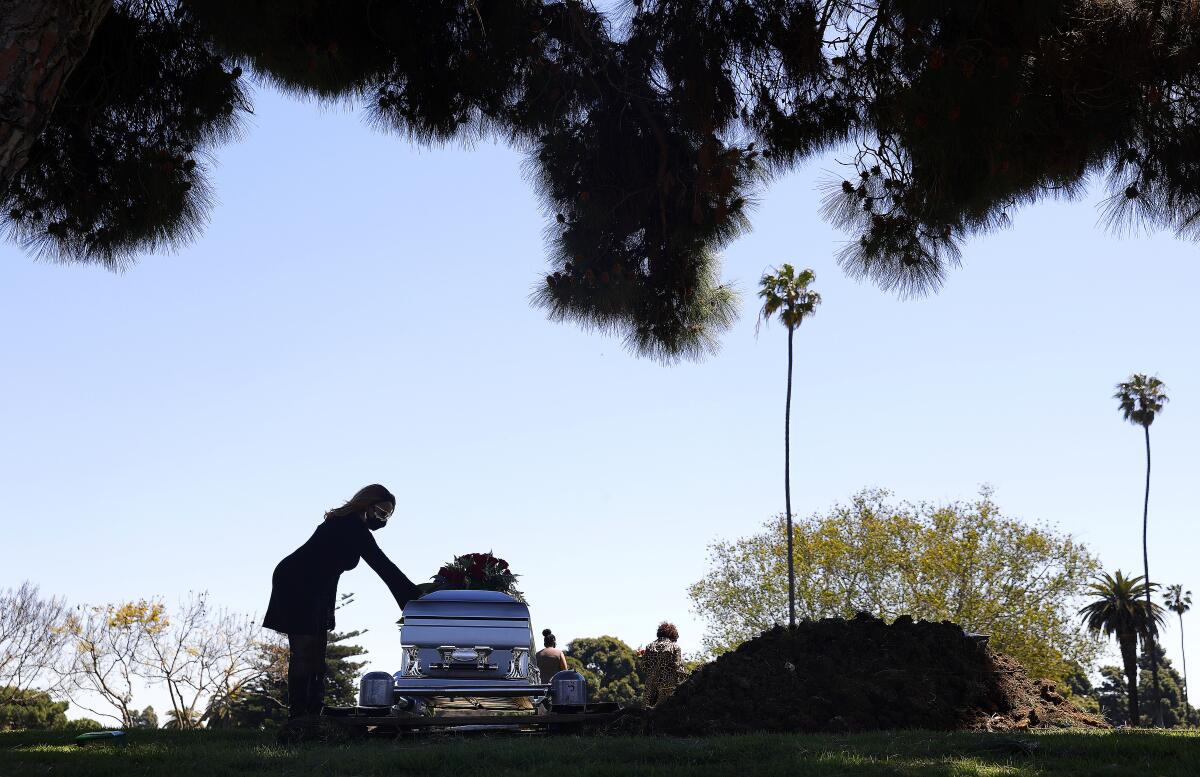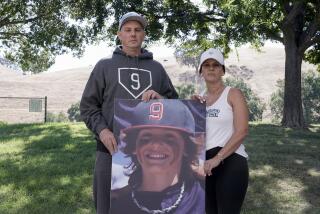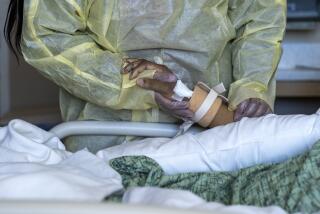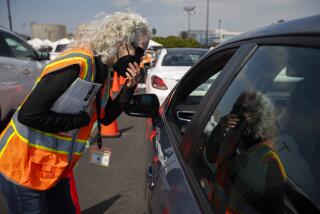Her bestie died of COVID-19. Now she is helping Black people find trust in vaccines

- Share via
On the beautiful spring day that her bestie Charles “Chuck” Jackson was laid to rest in South L.A., Clarice Kavanaugh spent most of it restless in her car.
Staring at her phone behind rolled-up windows, she watched as the pastor delivered the eulogy online. Then as masked pallbearers carried his coffin from the funeral home. And finally as loved ones came and went from the cemetery.
Only a few weeks earlier, Jackson had been living it up in the mountains of Idaho with fellow members of the National Brotherhood of Skiers. And only a few weeks before that, the besties had gone to see the Temptations in concert just like they did every January.
But then, in a story of woe that is common now but wasn’t at the time, the healthy and active 64-year-old Black man contracted COVID-19 and died.
“I have never in my life visited a grave,” said Kavanaugh, recounting how she waited until everyone left Inglewood Park Cemetery to say her goodbyes that day in April. “Never.”
But it felt like the right thing to do.
It wasn’t the only thing she could do, though. And so, searching for a more profound way to honor Jackson, she decided to join a clinical trial for the COVID-19 vaccine developed by AstraZeneca and the University of Oxford.
Despite being a bit of a hypochondriac, Kavanaugh believes that taking the risk of injecting an unknown substance into her body is the best way to “keep his memory alive.” She also believes that, by setting an example, it’s the best way she can help other Black people.
“People are going to die because they don’t believe in the vaccine,” said Kavanaugh, who spent years working in sales for pharmaceutical companies and now teaches at the Chicago School of Professional Psychology in L.A. “I can have a voice and be an influencer.”
Indeed, even as coronavirus cases continue to climb to never-before-seen heights and overwhelm hospitals in Southern California, public health officials have been fretting about the high number of Americans of all races who are refusing to get vaccinated and what that could mean for ending the pandemic through herd immunity.
Black Americans are by far the most wary, many of us deeply distrustful of the medical establishment after decades of unequal access to care and unethical research, including the Tuskegee Syphilis Study.
Nationally, only about 24% of Black adults say they will probably or definitely take a vaccine when the time comes. In California, the percentage is closer to 30%, according to the Public Policy Institute of California, but that’s still lower than the percentage of Latino, Asian and white adults who plan to get vaccinated.
It tracks then that pharmaceutical companies haven’t had the easiest time persuading Black Americans to participate in clinical trials.
“They were begging for African Americans,” Kavanaugh said. “Because, of course, we ain’t volunteering. You know, ‘I ain’t being no guinea pig.’”
It’s important to have the data, though, because, along with Latinos, we are the most at risk for not only getting COVID-19 but also dying of it. This is what Kavanaugh told her adult children. Still, they weren’t thrilled that she had volunteered for the trial when she fessed up on Christmas Day.
“My oldest one didn’t say anything,” Kavanaugh said with a dismissive laugh. “My youngest one, she was like, ‘Well, you should have waited.’”
Her bestie probably would’ve said something similar. But then “he would have been cool,” she insisted. “He would have been bragging.”
::
My colleague Angel Jennings first wrote about Jackson after his funeral in April. He was a man who liked to go fishing in the Gulf of Mexico, didn’t miss a party, but who was generous enough to drive kids up to Big Bear or Mountain High to go skiing — and sometimes help foot the bill.
When he flew home from Idaho in March, he became sick within days. So sick that he ended up sedated and on a ventilator at the West Los Angeles hospital where his daughter works as a nurse. He died there after seeing his son one last time.
It’s a story that stuck with me — and not just because I first read it in my previous role as an editor. It’s because, like Jackson, the last thing I did in the Before Times was board a plane to meet up with some friends for a ski trip. In my case, in Colorado.
And like Jackson, two days after arriving home in L.A., I came down with horrible, flu-like symptoms. I went to work on Super Tuesday, feeling fine. Little did I know that would be my last day working in the office.
I woke up that Wednesday morning feeling terrible. Tired. Congested. I never had a fever or a cough. Looking back, I’m pretty sure it was just a bad cold. But, also like Jackson, I heard about people who had been at the same resorts where I had been and had come down with COVID-19.
Little did anyone know then, but those final days of the 2020 ski season turned out to be super-spreader events. It didn’t take long for Vail Resorts to shut down access to all of its mountain resorts, from Idaho to Colorado to California.
I never bought into the social-media-fueled conspiracy theories about Black people not being able to catch the coronavirus. But it was terrifying to understand just how close I had come to actually getting COVID-19. I got lucky. Jackson didn’t.
All these months later, essential workers, who are overwhelmingly Black and Latino, remain at the highest risk. But no one is immune.
In fact, a recent study out of New York found that biological differences don’t account for the racial and ethnic disparities in coronavirus cases. Rather it is that Latino and Black people are more likely to be poor, live in overcrowded housing and be exposed to the virus in the workplace. Not to mention the likelihood of getting sicker because of preexisting conditions that haven’t been addressed because of a lack of access to healthcare.
It’s one reason why race is being considered only indirectly in terms of how to distribute the vaccines “equitably,” as politicians love to say. Instead, public health officials are using a “social vulnerability index” to determine who is most in need.
All one has to do is connect the dots, though, to understand that systemic racism meted out against Black and Latino Americans, regardless of income, is exactly why such inequities and social vulnerabilities exist. It’s also why mass vaccination is so hard to do in the U.S.
::
Kavanaugh has already received the first dose of what she suspects is the actual AstraZeneca vaccine, though it could be a placebo. She gets the second dose this month. Then it’s all about following up and getting coronavirus antigen tests.
Even before Jackson died, Kavanaugh took the coronavirus seriously, wearing masks long before people were belligerently marching into malls refusing to wear them. She has bedazzled face shields and keeps a stash of gloves and Clorox wipes on hand.
She wants people to be safe and has fallen out with neighbors and friends over their refusal to do so. People don’t want to hear it, even though Los Angeles County reported more than 300 COVID-19 deaths Friday — a new single-day record.
“My prayer is that African Americans, save yourselves,” Kavanaugh said. “Make the right decisions for yourself. If you feel the vaccine is not right for you, then don’t do it. But what a hell of a thing to die. To leave this Earth when you have help at the touch of your hand, a phone call to your provider.”
Jackson, a friend with whom she shared a love of music and church for many years, didn’t have that chance.
Normally, at this time in January, they would be planning their night out for the Temptations concert. Instead Kavanaugh will be heading from her home in Long Beach back to Inglewood Park Cemetery to place flowers on his grave — a new annual tradition.
“My only picture I have of us is the last picture. We went to the Temptations,” she said. “Chuck normally would say, ‘I ain’t taking no damn selfie.’ But I said, ‘Chuck, come on. Selfie.’ He took it. Right before he died.”
More to Read
Sign up for Essential California
The most important California stories and recommendations in your inbox every morning.
You may occasionally receive promotional content from the Los Angeles Times.














